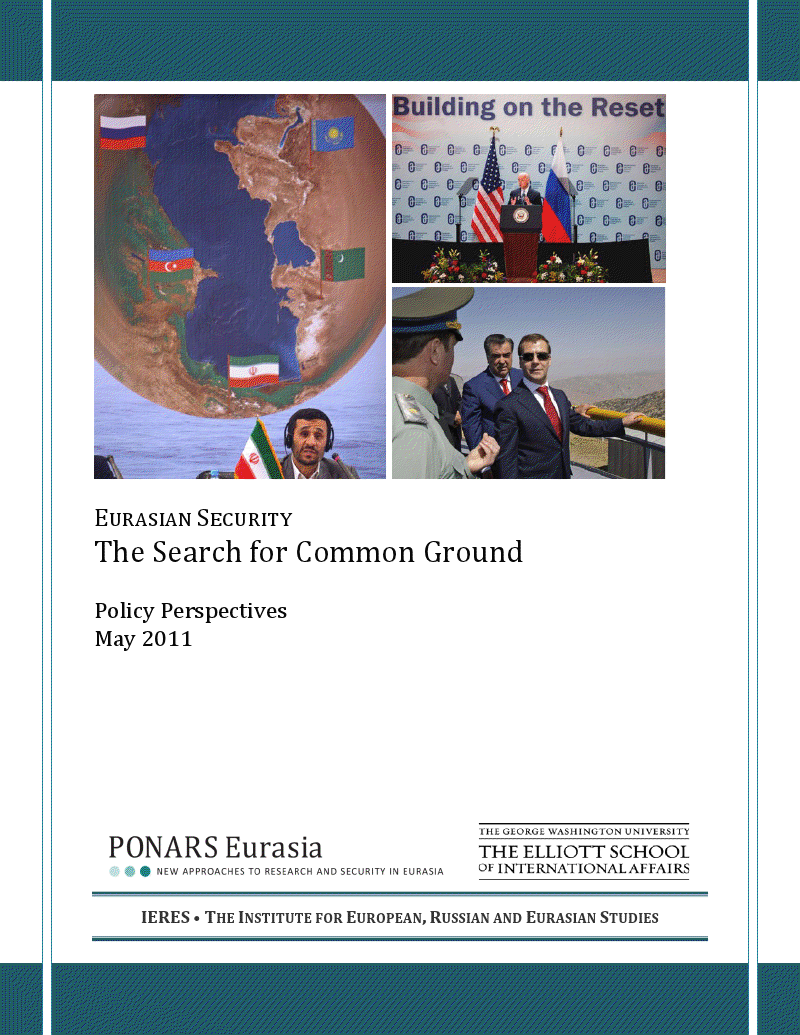Foreword
by Cory Welt
The George Washington University
This collection of essays is based on the proceedings of a March 2011 workshop of the Program on New Approaches to Research and Security in Eurasia (PONARS Eurasia), held in collaboration with the Institute of World Economy and International Relations (IMEMO), Russian Academy of Sciences, Moscow. PONARS Eurasia is a program that promotes scholarly work and policy engagement on transnational and comparative topics within the Eurasian space, based on the expertise of a global network of social scientists.
The workshop—on Security Challenges in Russia and Eurasia—brought together scholars and experts from the Russian Federation, the United States, and Europe (including Ukraine and Azerbaijan) to propose initiatives for deepening international security cooperation in Eurasia; to consider the implications of changing relationships between Russia, the EU, and countries of post-Soviet Eastern Europe and the Caucasus; and to assess the domestic foundations of Russian security and democratic stability. We are publishing twenty-three essays from the workshop in three collected volumes, of which this is the first.
This volume, Eurasian Security: The Search for Common Ground, examines the prospects for deepening international security cooperation in Eurasia. The three essays in Part I propose a variety of cooperation initiatives in Eurasia, primarily focusing on energy and counter-narcotics. Kimberly Marten proposes greater openness to Russian participation in the Trans-Afghanistan Pipeline project; exchange of best practices in counternarcotics and border control; and a sustained defense industrial relationship between NATO member states and Russia. Looking specifically at the Caspian Sea, Dmitry Gorenburg also endorses greater cooperation in pipeline development, as well as deeper involvement of the United States and Russia in multilateral initiatives in counter-narcotics and, gradually, counter-terrorism and counter–proliferation. Turning to Central Asia, George Gavrilis calls for greater donor coordination of security assistance across country-specific (and Central Asia and Afghanistan) portfolios on, in particular, counter-narcotics and the tailoring of security cooperation with different governments in ways that are most likely to gain traction.
Part II of the collection takes stock of three ―security sub-regions‖ in Eurasia: the Black Sea, Caspian Sea, and Central Asia. Volodymyr Dubovyk argues that at a time of reduced European interest in the Black Sea, there is reason for even greater European engagement, on issues ranging from conflict resolution and energy transit to trafficking (in humans, weapons, and narcotics), democratic development, and environmental security. Andrey Makarychev observes that the nearby Caspian Sea is at best hesitantly evolving into a coherent region, thanks to the persistence of divergent economic, political, and security interests among littoral states and their differing relations with Western actors, themselves possessing predominantly economic rather than security stakes in the region. Finally, Alexander Cooley assesses the ineffectiveness of regional security organizations in Central Asia, chalking it up to enduring suspicions of sovereignty-threatening external actors and a reluctance to intervene in countries’ internal affairs, as well as by geopolitical competition that encourages local actors to seek bilateral, rather than multilateral, security solutions.
Finally, Part III forecasts the fate of nuclear nonproliferation efforts in the region and beyond. Pavel Baev argues that Russia’s support for sanctions against Iran has reached its limits: Russia may derive some economic benefit from Iran’s pariah status, but Moscow sees sanctions as ultimately ineffectual and believes Iran’s nuclear development to be all but inevitable. On the other hand, Yoshiko Herrera and Jacques Hymans attribute the staying power of the Nuclear Nonproliferation Treaty (NPT) to what they call a ―conditional‖ norm, one its adherents accept as applicable in different ways to different countries, namely by allowing those member-states who possessed nuclear weapons prior to the NPT’s entry into force to keep them. They argue that the greatest threat to the NPT comes not from such ―double standards‖ but by the perception that nuclear-weapons states, the United States in particular, are willing to selectively reward states that break the norm (i.e., India) while preventing others from developing civil nuclear technology (i.e, Iran).
We are sure you’ll find these policy perspectives informative and thought- provoking. Many individuals were instrumental in the production of this volume, as well as the organization of the workshop that generated it. I would like to especially thank our colleague and co-organizer, IMEMO Leading Research Fellow Irina Kobrinskaya; Managing Editor Alexander Schmemann; Program Assistant Olga Novikova; Graduate Research Assistants Wilder Bullard and Julija Filinovica; IERES Executive Associate Caitlin Katsiaficas; and IERES Director Henry Hale. PONARS Eurasia, together with The George Washington University’s Elliott School of International Affairs, expresses its deep appreciation to the International Program of the Carnegie Corporation of New York for its ongoing support.









